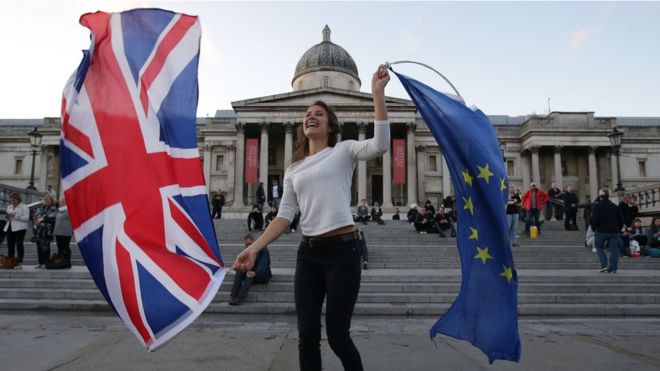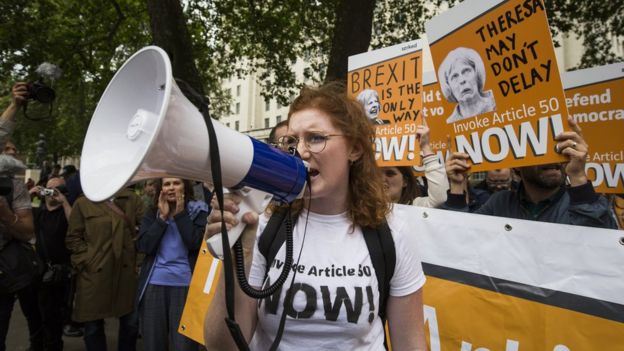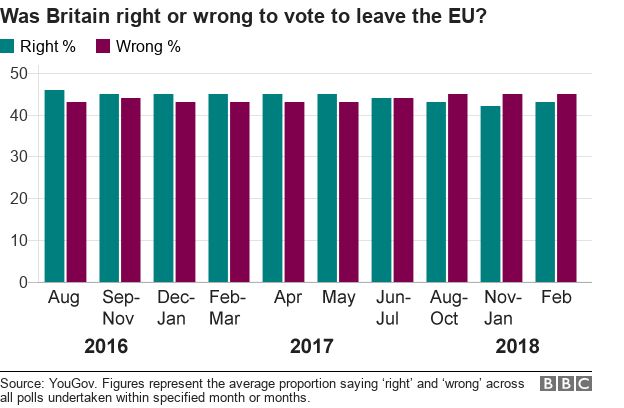With little more than a year to go before the UK is due to leave the European Union, the issue of Brexit remains a divisive one. Where does public opinion currently stand?
Brexit continues apace, with controversy never far away.
The prime minister recently proposed the UK should leave both the single market and customs union. Labour countered that the country should remain in a customs union.
Former prime ministers Sir John Major and Tony Blair, have both suggested that Parliament should be prepared to vote down any "hard" deal and consider holding a second referendum - a possibility dismissed by Brexit campaigners.
None of this might matter if Theresa May had a safe overall majority in the House of Commons and a parliamentary party that was united in its support for Brexit.
But she has neither - and so speculation that the vote to leave the EU might yet be overturned continues.
However, is there any reason to believe the outcome might be different if the issue were to be put to voters once again?
After all, the result in June 2016 was relatively close - Leave won by 52% to 48% - so not many people would have to change their minds to produce a different verdict.
Polls that ask people how they would vote now in response to the question that appeared on the ballot paper in June 2016 have, in fact, been relatively few and far between.
But those that have been conducted suggest there may have been a small swing in favour of Remain.
The four most recent readings - taken by BMG Research and Survation between November and January - have, on average, once the 8% who said "don't know" are left to one side, put Remain on 52% and Leave on 48%.
In contrast, four such polls undertaken towards the end of 2016 still put Leave narrowly ahead, by 51% to 49%.
Similarly, four recent polls - conducted by ICM and ComRes between December and March - that looked at how people might vote in a second referendum, albeit without posing the exact question that was on the ballot paper, have also on average put Remain slightly ahead - by 51% to 49%.
More regular readings of how voters now view Brexit have been provided by a question that YouGov have put to their respondents since shortly after the referendum.
This reads, "In hindsight, do you think Britain was right or wrong to vote to leave the EU?"
There is a clear, if hardly dramatic trend.
Up until last year's general election those who answered "right" narrowly outnumbered those who said "wrong".
Since the election the position has been reversed, with those saying that the decision is "wrong" slightly more numerous than those who replied "right".
So, all of the polling evidence points in the same direction - there appears to have been a slight drop in backing for Brexit such that the balance of opinion might now be the reverse of what it was in June 2016.
- Brexit: All you need to know
- Immigration: Who should we let in after Brexit?
- What will Brexit mean for overseas territories?
But at this point considerable caution is in order.
Opinion polls are not always wholly accurate. Polling is too hazardous an enterprise for the position to be otherwise.
When the polls are as close as they are on Brexit, the only sensible judgement we can make is that the outcome of any second referendum is too close to call.
All that can assuredly be said is that the UK is split down the middle on the subject, just as it was in June 2016.
The uncertainty about the outcome of any future referendum is underlined when we look under the bonnet of the polls.
The reason why most polls now have Remain narrowly ahead is not because more voters have switched from Leave to Remain than have made the journey in the opposite direction.



